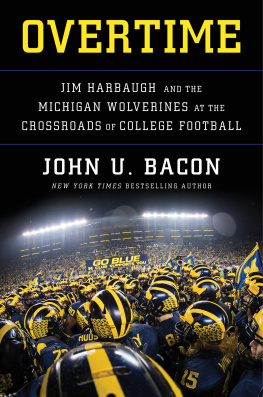INDEX OF QUOTATIONS AND FOREIGN PHRASES WITH TRANSLATION
The figures in brackets refer to the pages.
Abeunt studia in mores (151): Studies pass into [ i.e . go to form] character.
Adeste, si, etc. (7): Come now, if anything remains for me to do.
Amici curi ... parasiti curi (164): friends of the court... parasites of the court.
Animasque in vulnere (166): And leave their lives [souls] in the wound.
At domus, etc . (110): But the house of neas shall rule over all the coastshis childrens children, and those that shall be born of them.
Atque is habitus, etc . (48): The temper of mens minds was such,
that while only a few dared to do so vile a deed, many desired it and all acquiesced in it.
Csarem portas (122): You carry Csar and his fortune.
Cogita quam diu, etc. (6): Consider how long you have been doing the same things: death may be desired not only by the valiant or the miserable, but also by the victim of ennui.
Communia maledicta (167): ill words applicable to all and sundry.
Concessum propter duritiem cordis (123): a thing allowed on account of the hardness of mens hearts. ( Cf. S. Matt. xix. 8.)
Conflat magn invidi (42): When great ill-will has been conceived [towards a ruler], all his acts, good or bad, alike condemn him.
Consilium Pompeii (96): Pompey follows a truly Themistoclean policy: he thinks that he who commands the sea, commands all.
Cum non sis, etc . (31): When you are no longer the man you have been, there is no reason why you should wish to live.
Cymini sectores (151), dividers of cummin-seed, hair-splitters.
De facto (32): as a fact, as an actual possession.
Desemboltura (121), dexterity, readiness (so defined in Richard Percyvalls Bibliotheca Hispanica, 1591); and adroitness which finds an easy and graceful outlet on all occasions for what it is in a man to do or say.
Devita profanas, etc . (10): Avoid profane novelties of words and oppositions of science falsely so called. (1 Tim. vi. 20.)
Dolendi modus (44): There is a limit to grieving, but none to fearing.
Duces belli (161), military leaders.
Ecce in deserto... Ecce in penetralibus (8): Behold, he is in the desert.... Behold, he is in the secret chambers. (S. Matt. xxiv. 26.)
Erant in officio (43): They were full of zeal, and yet rather inclined to discuss than to execute the orders of their officers.
Et conversus Deus (32): And God turned to behold the works which his hands had made, and saw that all were very good. (Genesis i. 31.)
Extinctus amabitur idem (7): The same man, [an object of ill-will while alive], shall be loved when his light is out.
Faber quisque (121): Every man is the architect of his own fortune.
Feri, si, etc . (7): Strike, if it be for the good of the Roman people.
Fons turbatus, etc . (162): A righteous man being cast in his suit in presence of his adversary, is as a troubled fountain and a corrupt spring. (Prov. xxv. 26.)
Hc pro amiciti (82): These things, out of regard for our friendship, I have not concealed.
Hinc usura vorax (44): Hence usury rapacious, and interest greedily advancing to the reckoning-day, hence credit shaken, and war that was a gain to many.
Hoc agere (65), keep to the business in hand.
Hominem delirum (78): A madman, who wrecks weighty realities on mere verbal subtleties.
Idem manebat (128): He remained the same, when it was no longer becoming to him.
Ignavum fucos pecus (123): The drones, an idle swarm, they banish from their hives.
Illam Terra parens (42): Her did mother Earth, inflamed with wrath against the Gods, bring forth (so runs the story), youngest sister to Cus and Enceladus.
Ille etiam ccos, etc . (42): He also [the sun] often gives warning of dark rebellions imminent, of treachery and hidden warfare brewing.
Illi mors gravis (31): Death falls heavy on him, who, too well known to all others, dies to himself unknown.
In illo viro (121): There was in him such strength of body and mind, that in whatever rank he had been born, he would have been likely to win fortune for himself.
Iniquum petas (149): Ask for more than is just, in order to get what is just.
In nocte consilium (65): Night brings counsel.
In studio rei, etc . (107): In his pursuit of wealth it was plain that he sought, not food for avarice, but an instrument of doing good.
In sudore vults alieni (108, 123), in the sweat of anothers face.
In sudore vults tui (123): In the sweat of thy face, shalt thou eat thy bread. (Genesis iii. 19.)
In veste varietas (10): Let there be variety in the garment, but no rent or cut.
Invidia festos (28): Envy keeps no holidays.
Ira hominis (12): The wrath of man doth not fulfil the justice of God. (S. James i. 20.)
Jam Tiberium vires, etc . (7): Tiberius was fast losing his bodily strength, but not his gift of dissimulation.
Judicis officium (163): It is a judges office to inquire not only into the facts of a case, but into the times and occasions thereof.
Jus civitatis (93), the right of citizenship; jus commercii, etc .: the right of trading, of marriage, of inheritance, of voting, of holding public offce.
Juventutem egit (127): He spent a youth full of errors, nay of madnesses.
Laudando prcipere (156), to instruct by praising.
Legi a se, etc . (47): That his soldiers were levied, not bought.
Liberatores or salvatores (161), deliverers or saviours.
Liberius, quam, etc . (43): More freely than was compatible with respect for their rulers.
Livia, conjugii, etc . (7): Farewell, Livia, keep after me the memory of our marriage.
Magna civitas (80): A great city is a great solitude.
Magnificabo (157): I will magnify mine office. (Romans xi. 13.)
Magno conatu nugas (78), [produce] trifles with great effort.
Materiam superabit opus (46): The workmanship will excel the material.
Melior natura (51), a better nature.
Memento quod es, etc. (61): Remember that thou art man.Remember that thou art a God, or Gods vice-gerent.
Mitte ambos (68): Send them both naked before strangers and you shall see.
Multum incola fuit (118): My soul hath been a long sojourner. (Ps. cxx. 6.)
Negotiis pares (89, 161), (men who are) equal to conducting affairs.
Nomen bonum (156): A good name is like a fragrant ointment. (Eccl. vii. 1.)
Non Deos vulgi (50): It is not profane to deny the gods of the vulgar; but it is profane to apply to the gods the beliefs of the vulgar.
Non est curiosus (25): An inquisitive man is sure to be malevolent also.
Non est jam dicere (50): We cannot now say: As the people, so is the priest. For in fact the people are not so [bad] as the priest.
Non inveniet (64): He shall not find faith on the earth. (S. Luke xviii. 8.) Cf. Essay i. p. 4.
Nos scimus (165): We know that the law is good, provided that a man use it lawfully. (1 Tim. i. 8.)
Nunc dimittis (7): S. Luke ii. 29.
Octogesimus octavus (112): Eighty-eight, a year of wonders.
Omnis fama (160): All reputation comes from those who are of a mans household.
Omnium consensu (33): All men deemed him fit for empirehad he never become emperor.
Omnium qu dixerat (159): He had an art of displaying to advantage all that he said and did.
Optimi consiliarii (65): The best counsellors are the dead.
Optimum elige (21): Choose the best, and custom will make it pleasant and easy.
Optimus ille (117): He best asserts the souls freedom, who snaps the fetters that gall his breast, and ceases once for all to suffer.



















